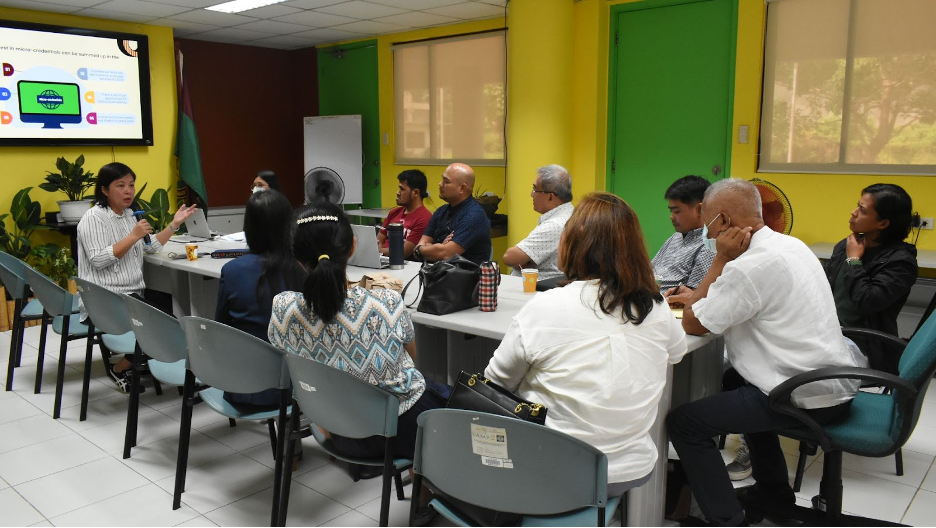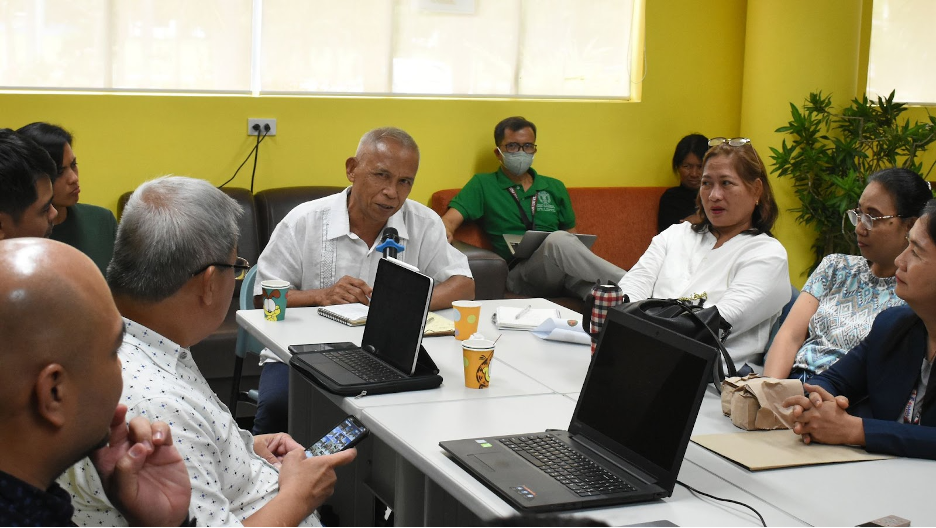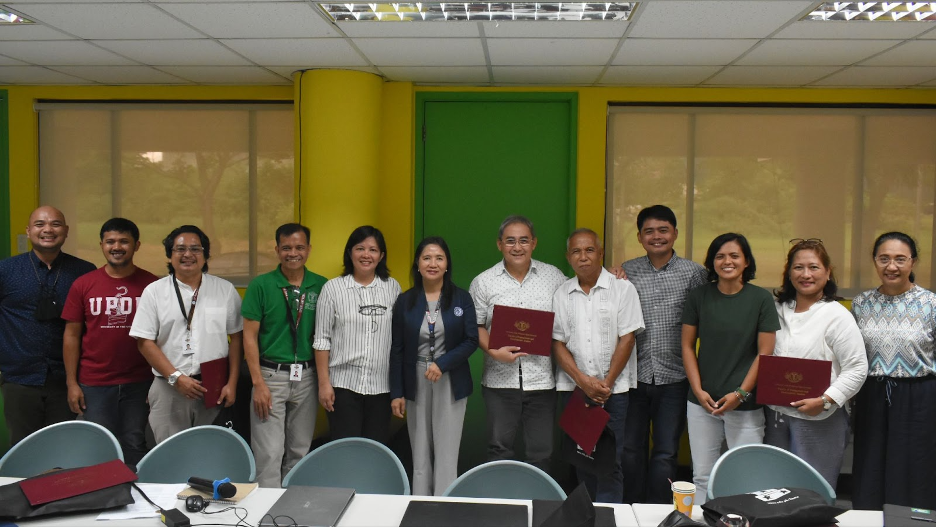
FMDS Dean Joane V. Serrano discussing the micro-credentials in the context of UPOU.
As the University of the Philippines Open University (UPOU) gears towards micro-credentialing given its strategic area on “Performing the major functions of a University” where the action point on “Micro-credentialing and stackable credits towards a degree” is included, the Continuing Education Program (CEP) of the Faculty of Management and Development Studies (FMDS) conducted a roundtable discussion (RTD) to unbundle its non-formal course in organic agriculture (OA) as a micro-credential course to make it more relevant.
The RTD was held on 04 May 2023 at the Sandbox, Centennial Center for Digital Learning, UPOU Headquarters. The event brought together OA learners, course completers, practitioners, the Supervising Technical Education and Skills Development Authority (TESDA) Specialist, and other stakeholders who are interested in the initiative.
Considering UNESCO’s definition of a micro-credential, unbundling of the UPOU’s non-formal course in organic agriculture as a microcredential course through this RTD aimed to: 1. examine the UPOU’s OA’s non-formal course vis-a-vis the TESDA’s Organic Agriculture Production National Certificate (NC) II; 2. design a record of focused learning achievement verifying what the learner knows, understands or can do; 3. identify assessment based on clearly defined standards to be awarded by a trusted provider; 4. develop standalone values that may also contribute to or complement other micro-credentials or macro-credentials, including through recognition of prior learning; and 5. recognize the standards required by relevant quality assurance (e.g. TESDA).
The event was formally opened by Dr. Joane V. Serrano, Dean of the FMDS. Dean Serrano put premium on why the OA RTD was held: “The UPOU was created to widen access to quality education, both degree and non-formal courses. We want to address the needs of our enrolled students, whatever their reasons are. We are not just producing students who will graduate, we are creating continuing programs for students not only to be hired by the industry but to address a bigger cause. We are creating programs in response to the needs of the community.”
Dean Serrano also gave an overview of micro-credentials and micro-credentialing in the context of UPOU. Micro-credentialing is a process that provides certification to individuals who have acquired a specific set of skills or competencies in a particular area. It differs from traditional degree programs as it focuses on short-term, targeted courses to equip learners with the skills they need to succeed in their careers.
Dean Serrano’s discussion of micro-credentials and micro-credentialing was followed by a presentation from Mr. Emilio B. Climaco, current Course coordinator of the UPOU’s OA non-formal course. Mr. Climaco shared the course outline being used in the delivery of OA composed of 10 modules, namely: 1. Introduction to Organic Agriculture; 2. Principles and Related Concepts of Organic Agriculture; 3. Close Encounters with the Soil in Organic Agriculture; 4. Organic Fertilizers; 5. Organic Crop Production; 6. Organic Pest Management; 7. Organic Animal Production; 8. Fair Marketing of Organic Products; 9. Organic Certification and Guarantee Systems; and 10. Promoting Organic Agriculture with the OA Action Plan as the final course requirement.
Mr. Brian A. Belen, a TESDA accredited trainor and competency assessor, tackled OA Production NC II of TESDA. This course is designed to enhance the knowledge, desirable skills and attitudes of OA Production NC II in accordance with industry standards. Mr. Belen discussed the basic, common, core, and elective competencies of the course.
The RTD emphasized the significance of the OA micro-credential course in promoting sustainable agriculture practices, reducing the impact of climate change, creating economic opportunities for farmers and other stakeholders, and attracting younger generations to farming. With the average age of Filipino farmers in the older years, the course hopes to create a new generation of practitioners who are knowledgeable and skilled in sustainable agriculture practices.

The OA micro-credential course targets farmers, agriculture practitioners, students, and other individuals who are interested in learning about organic agriculture. Its vision is to create a skilled workforce in the organic agriculture sector.
The participants also discussed potential future micro-credential programs, including courses on beekeeping, composting, ornamental and herb gardens, among others.

OA RTD participants from left to right: Mr. Brian A. Belen, Mr. Emilio B. Climaco, Dr. Pedcris M. Orencio, Program Development Associate of the Continuing Education Program, Mr. Larry N. Cruz, FMDS Dean Joane V. Serrano, Supervising TESDA Specialist Ms. Marites N. Caballero, Mr. Efren L. Elane, Prof. Raymundo M. Lucero, Mr. Mark Dexter Iglesias, Ms. Patricia Mae Z. Bravante, Ms. Rowena Morito, and Ms. Tricia C. Ascan
Hosted by Ms. Mary Grace C. Perez, a Project Staff at the FMDS, the OA RTD was participated in by Dr. Serrano who discussed micro-credential and micro-credentialing in the context of UPOU, Mr. Climaco and Mr. Belen who served as the presenters/resource persons of UPOU’s OA and TESDA’s OA Production NC II, respectively, together with six discussants, namely: Ms. Rowena Morito, an OA course completer, Mr. Efren L. Elane, a current OA course enrollee, Ms. Patricia Mae Z. Bravante and Mr. Mark Dexter Iglesias, OA course completers and practitioners, Prof. Raymundo M. Lucero, a former OA course coordinator and practitioner, and Ms. Marites N. Caballero, the Supervising TESDA Specialist. Dr. Pedcris M. Orencio, a regular faculty at FMDS and Program Chair of the Diploma in Land Use Planning program served as the moderator..
The event was officially closed by Mr. Larry N. Cruz, Program Development Associate of the UPOU-FMDS’ Continuing Education Program. The RTD ended with a strong commitment from the participants to support the development and delivery of the OA micro-credential course and to promote the benefits of micro-credentialing as a form of lifelong learning, attracting younger generations to farming, and empowering individuals.
Written by Sydney Rovin Macahiya• Edited by Larry N. Cruz

















FMDS Socials